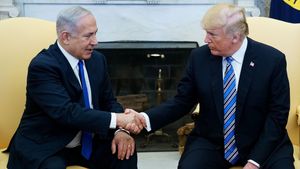The conflict between Israel and Palestinian entities has seen significant escalation, particularly evidenced by recent airstrikes and military operations aimed at rooting out Palestinian armed groups from the West Bank. The situation remains dire, with increasing casualties reported.
According to the Palestinian health ministry, the recent round of violence has resulted in the deaths of five individuals, including notable victims such as 16-year-old Ahmad al-Sadi, who was killed during Israeli airstrikes on the city of Jenin. This tragic loss reflects the urgent need for addressing the spiraling violence.
The backdrop to these strikes involves Israel's "Iron Wall" operation, which recently intensified following the conflict with Hamas after the outbreak of violence last year. With the stated objective to dismantle militant capabilities, Israeli forces have engaged heavily around Palestinian populated areas, particularly targeting Jenin, which has been historically recognized as a stronghold for armed resistance.
Reports indicate the Israeli military began operations around Jenin on January 21, just as hostilities shifted focus after the ceasefire with Hamas. Military tactics have included the deployment of infantry, drone surveillance, and airstrikes, leading to intense confrontations with armed Palestinian factions. Eyewitness accounts have noted heavy military presence, with the army blocking exits around the Faraa refugee camp, leading to significant disruptions to daily life for local residents.
"The army was blocking the exits of the nearby Faraa refugee camp and entering homes," reported an AFP journalist during these chaotic scenes, as military operations extended to five villages, as officially stated by the Israeli Defense Forces (IDF). Israeli military communications echoed the urgency, noting the operational scope as part of broader anti-terror campaigns targeting regions perceived to harbor militants associated with Iran, whose influence is consistently cited as exacerbative of regional terrorism.
On the morning of January 22, airstrikes struck multiple locations, with incidents leading to the immediate deaths of two individuals identified as Abdul Issam Alawneh and Saleh Zakarnah during drone strikes on a vehicle. Further violence ensued with more airstrikes claimed to have influenced fatalities among youths on motorcycles, leading to heightened tensions.
Previous to these escalations, the unfortunate deaths over the weekend illustrated the toll of the mounting conflict. The victims not only displayed the tragic toll of military actions but also brought to light the wider humanitarian ramifications as civilian life collapsed amid the violence.
Statistics share alarming insights; since the outbreak of hostilities, Israeli troops or settlers have reportedly killed 882 Palestinians, even as 30 Israelis have died as well during confrontational actions by groups within the region. The deteriorated conditions have limited avenues for civilians and escalated the humanitarian crisis.
The Israeli government stands firm on its placement of blame upon groups operating under the guise of terrorism, attributing regional security risks and deteriorated conditions to Iranian influence and support. The narrative conveyed by the Israeli military reflects intentions to maintain heightened security for its citizens by suppressing any armed threat.
Analyzing the conflict's underlying dynamics will be instrumental for international observers and parties seeking to mediate peace. Prolonged military operations are anticipated to prolong the humanitarian crisis as responses from various factions invoke retaliatory escalations. Calls for broader diplomatic engagement and de-escalation become imperative as international communities reassess their involvement.
While the military actions may aim to fortify regional security, the humanitarian outcomes for Palestinian communities remain precarious, fueling cycles of violence and retaliation. Moving forward, examination of viable approaches to peace and civilian safety must take precedence against the backdrop of relentless military operations. The urgent need for strategic dialogue remains one of the most pressing aspects needed to alter the devastating impact of this conflict.
The fate of the West Bank lies uncertain as military objectives clash with the basic humanitarian needs of its residents, painting a heartbreaking picture of continued conflict. Further analysis is required on the humanitarian responses, the involvement of regional players, and the steadfast commitment to solutions enabling sustainable peace.



